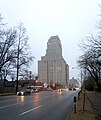Preston J. Bradshaw
Preston J. Bradshaw | |
|---|---|
| Born | 1884 St. Louis, Missouri |
| Died | 1953 |
| Nationality | American |
| Occupation | Architect |
| Buildings | Bellerive Apartment Hotel Brown Hotel Roberts Mayfair Hotel Paul Brown Building |
Preston J. Bradshaw (1884–1952) was one of the most eminent architects of St. Louis, Missouri, during the 1920s. Among his numerous commissions as an architect, he is best known for designing hotels and automobile dealerships in the region. Like many hotel architects of his time, he eventually moved into the actual operation of hotels, becoming owner and operator of the Coronado Hotel in St. Louis.[1]
Biography[]
Bradshaw graduated from Columbia University. This was followed by a period working in the office of architect Stanford White in New York City, after which he was a drafter for the Commissioner of Public Buildings of St. Louis.[2] Later Bradshaw opened his own office as an architect.
Notable commissions: Before 1920[]
In chronological order by opening date.
- Drake Plaza (1915), 3307 Olive Street, St. Louis, Missouri, also known as Plaza Hotel, and Drake Hotel, six stories.[2][3] Originally a hotel, the building is now used as apartments.
- Autocar Sales and Service Building (1917), 2745 Locust Street, St. Louis, Missouri, two stories. Listed on the National Register of Historic Places.[4] Autocar was a small manufacturer, and after it ceased operations in 1923, the building was occupied by a succession of other auto-related businesses.
Notable commissions: 1920s[]
In chronological order by opening date.
- Art Loft (1921), 1531 Washington Avenue, St. Louis, Missouri, 10 stories. This structure was originally an industrial building, now converted into residential living spaces.
- Jesuit Hall of St. Louis University (1921), 3601 Lindell Boulevard, St. Louis, Missouri, 14 stories, originally Melbourne Hotel. The building serves as a faculty residence.
- Bellerive Apartment Hotel (1922), 214 East Armour Boulevard, Kansas City, Missouri, nine stories, also known as Bellerive Hotel.[5] Listed on the National Register of Historic Places.
- Chase Park Plaza Hotel (1922), 212 North Kingshighway Boulevard, St. Louis, Missouri, 10 stories, originally the Chase Hotel.
- The Westmoreland (1922), 245 Union Boulevard, St. Louis, Missouri, 10 stories,
- Brown Hotel (1923), 337 West Broadway, Louisville, Kentucky, 16 stories. also known as the Camberley Brown Hotel. Listed on the National Register of Historic Places.
- Coronado Hotel (1923), 3701 Lindell Boulevard, St. Louis, Missouri, 15 stories, now known as Coronado Place.
- Forest Park Hotel (1923), 4910 West Pine Boulevard, St. Louis, Missouri, six stories. Listed on the National Register of Historic Places.
- Baker Hotel (1925, demolished in 1980), 1400 Commerce Street, Dallas, Texas, 19 stories.
- Mayfair Hotel (1925), 800 Saint Charles Street, St. Louis, Missouri, 18 stories. Listed on the National Register of Historic Places.
- (1925–1926), 818 Olive Street, St. Louis, Missouri, 16 stories, originally offices and now apartments.[6] Listed on the National Register of Historic Places.
- Vesper-Buick Auto Company Building (1927–1928, demolished in 1995), 3900 West Pine Street, St. Louis, Missouri, two stories.[7] It was noteworthy for its use of the Spanish Colonial Revival style, and was demolished despite being on the National Register of Historic Places.
- Renaissance St. Louis Suites Hotel (1929), 823 Washington Avenue, St. Louis, Missouri, 24 stories. Originally known as Lennox Hotel.[8] Listed on the National Register of Historic Places.
Notable commissions: 1930s[]
In chronological order by opening date.
- Robert A. Young Federal Building (1933), 1200 Spruce Street, St. Louis, Missouri, 10 stories with a 20-story tower. It had initially been built as a warehouse for the Terminal Railroad Association of St. Louis, and was acquired by the federal government in 1941.[9]
Notable commissions: 1950s[]
In chronological order by opening date.
- Ford on the Plaza Apartments (1950), 1405 Pine Street, St. Louis, Missouri, 14 stories, also known as Ford Apartments. Listed on the National Register of Historic Places.
Gallery[]

Brown Hotel (1923)
Louisville, KentuckyForest Park Hotel
Saint Louis, Missouri
Chase Park Plaza hotel and condominiums
Saint Louis, Missouri
References[]
- ^ Bradshaw, Preston J. (December 1929). "Making Hotels Financially Productive". Architectural Forum. 51 (6): 715–722.
- ^ a b Wafer, Deborah B. (1985). "National Register of Historic Places - Nomination Form: Plaza Hotel Complex". United States Department of the Interior. Archived from the original (PDF) on 2012-11-21. Retrieved 2009-08-03.
- ^ "Emporis / Preston J. Bradshaw". Emporis. Retrieved 2009-08-03.
- ^ Baxter, Karen Bode; Ruth Kenoy; Timothy P. Maloney (2006). "National Register of Historic Places - Nomination Form: Autocar Sales and Service Building". United States Department of the Interior. Archived from the original (PDF) on 2012-11-21. Retrieved 2009-08-03.
- ^ Michalak, Joan A. (1979). "National Register of Historic Places - Nomination Form: Bellerive Hotel". United States Department of the Interior. Archived from the original (PDF) on 2012-12-28. Retrieved 2009-08-03.
- ^ Josse, Lynn; Stacy Sone (2002). "National Register of Historic Places - Nomination Form: Paul Brown Building". United States Department of the Interior. Archived from the original (PDF) on 2012-11-21. Retrieved 2009-08-03.
- ^ Stiritz, Mary M. (1986). "National Register of Historic Places - Nomination Form: Vesper-Buick Auto Company Building". United States Department of the Interior. Archived from the original (PDF) on 2012-11-21. Retrieved 2009-08-03.
- ^ Stiritz, Mary M. (1984). "National Register of Historic Places - Nomination Form: Lenox Hotel". United States Department of the Interior. Archived from the original (PDF) on 2012-11-21. Retrieved 2009-08-03.
- ^ "Robert A. Young Federal Building". U.S. General Services Administration. 2009-06-12. Retrieved 2009-08-05.
- 1884 births
- 1953 deaths
- 20th-century American architects
- Architects from St. Louis
- Columbia Graduate School of Architecture, Planning and Preservation alumni


